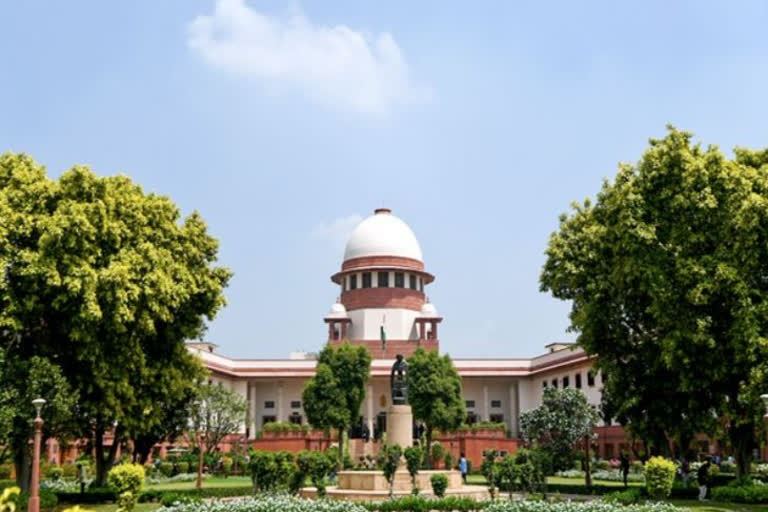New Delhi: The ruling Dravida Munnetra Kazhagam (DMK) has submitted before the Supreme Court that it is discriminatory to exclude Tamil refugees from the purview of the Citizenship (Amendment) Act, 2019 and prayed that the legislation be declared null and void as it is unconstitutional and 'destroys the basic fabric of secularism.'
The party sought the CAA to be declared unconstitutional as it is ultra vires of Articles 14 and 21 of the Constitution and said the Act is 'arbitrary' as it relates to only three countries, Pakistan, Afghanistan and Bangladesh and also covers only Hindus, Sikhs, Buddhists, Jains, Parsis and Christian communities from such nations and expressly excludes Muslims. "The act deliberately keeps away the people belonging to Muslims who had suffered persecution in the three countries and therefore it is highly discriminatory and manifestly arbitrary," the DMK said.
In an additional affidavit filed on behalf of the DMK in the apex court, the party's organising secretary R S Bharathi said that the Indian origin Tamils, who fled Sri Lanka due to persecution and now in India as refugees, are out of the ambit of the legislation. He contended that the Central government in its counter affidavit in October 2022 has categorically remained silent to the plight of the Tamil refugees.
"The step-motherly behaviour (of the Centre) towards Tamil refugees has left them living in constant fear of deportation and an uncertain future." Being stateless, they have been denied employment in government services, organised private sector and the right to property and voting. He said the CAA was against, the "Tamil race and keeps out the similarly placed Tamils who are residing in Tamil Nadu from the purview of the Act."
It ignored the reality that for several decades Tamil refugees who have settled in Tamil Nadu are deprived of fundamental and other rights due to non-citizenship and due to "non-citizenship and due to non-naturalisation" and the Act does not provide any reasons to exclude them and hence, discriminatory.
The Act introduced a completely "new basis for the grant and non-grant of citizenship on grounds of religion, which destroys the basic fabric of secularism. There is no reasons as to why Muslims were altogether excluded even in the three countries wherein they have suffered from persecution."
Providing a background to the issue in the island nation, he said the tension between the Sinhalese and Tamil population in Sri Lanka has deep historical roots. 'The Tamils came from southern India.' There are two separate communities in the island nation which are the Sri Lankan Tamils and Indian origin Tamils. Both are of the same ethnic origin and speak the same language. The Indian origin Tamils now in the island nation were taken there from south India by the British rulers to work as bonded labourers in the coffee and tea plantations, mainly around Kandy, between 1852 and the 1930s.
The Sinhalese population of Sri Lanka, majority of them Buddhist, have historically considered the Tamils as 'invaders,' 'infringing' on Sinhalese territory. The identification of Buddhist religion with Sinhalese nationalism is an important element in understanding the conflict in Sri Lanka, he argued.
The Clause 9 of the Sri Lankan Constitution, not only gives importance to Buddhism over other religions but also empowers the state to protect and foster Buddhism.
According to the CAA, the basis for including Pakistan, Afghanistan and Bangladesh was that their Constitutions provided for a specific state religion due to which the religious minorities there faced prosecution on grounds of religion, Bharathi said in the affidavit. He claimed that the situation in Sri Lanka is similar to the one in Pakistan, Afghanistan and Bangladesh. Not only the Tamils have faced religious persecution as they were predominantly Hindus, they have faced 'rampant persecution' due to their minority status since Sri Lanka's independence from British rule.
To resolve the citizenship issues faced by the 9.75 lakh Indian Tamils residing in Sri Lanka, on October 30, 1964, India and Sri Lanka signed the Sirimavo-Shastri pact. About 3 lakh people were to be granted Sri Lankan citizenship while the government of India was to accept the repatriation of 5.25 lakh people. The status and future of the remaining 1.50 lakh people is the subject matter of a separate agreement between the two governments.
In substance, the government of India was obliged to grant citizenship to 6 lakh stateless Tamils with a natural increase in their numbers. Quoting from the Tamil Nadu government rehabilitation department's handbook, Bharathi said 3,03,076 people arrived in India as refugees from 1983 to 2010 in four phases. As of January 2010, the number of expatriates who arrived and registered were 4,61,631, he said, submitting relevant documents to support his claims.



